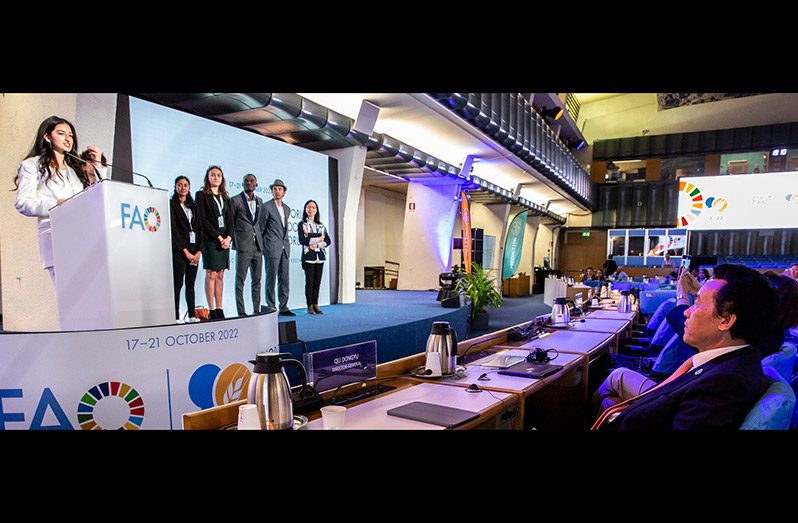— young people at the Global Youth Forum seek to galvanise policy-making to transform agri-food systems
YOUNG people laid out their priorities to ensure greater access to safe and nutritious food, and asked decision makers to work with them to implement effective policies as the main events of the Global Youth Forum wrapped up on Wednesday.
The hybrid youth event of the World Food Forum, which started on October 18, was held at the headquarters of the Food and Agriculture Organisation of the United Nations (FAO) in Rome.
Under the theme “Healthy Diets. Healthy Planet,” youth representatives presented some of their top priorities to the audience at the closing of the forum’s Youth Assembly, one of the spaces where young people met to talk about food policy and carry out agri-food systems advocacy.
Some of the key messages they had for policy makers were the need for greater funding, equitable representation of people from different parts of the globe in deliberations, capacity building and wider access to technological knowhow to encourage younger people to be a part of sustainable food production, and food education to teach youth how to eat better and waste less.
The FAO Director-General, QU Dongyu, addressed the audience saying he appreciated the efforts the young people had put in at the forum.
He hoped they could all work together to bring about the changes they proposed.
The 2022 Youth Assembly was following up on last year’s gathering where participants identified 17 global tasks in the context of the UN Food Systems Summit. This time round, over the course of the year, they identified five policy tasks per region to drive targetted local action to transform global agri-food systems.
In addition to the Youth Assembly, the event featured the WFF Innovation Lab for young entrepreneurs and scientists, a food education symposium, workshops by celebrity chefs and several other youth culture activities.
The WFF Transformative Research Challenge Finals and Startup Innovation Awards were highlights of the Innovation Lab. The former aims to inspire research and innovation in sustainable development to end hunger. Deviana Siregar, Davrina Rianda, Annisa Fajriani and Dyana Sari, who showed how to reduce food waste and food loss by empowering mothers, were joint winners along with Sofia Anna Enrica Cavalleri and Dr. Mauro Agnoletti, who looked at olive tea to assess the sustainability of traditional Mediterranean medicine.
The Startup Innovation Awards Finals gave an impetus to the next generation of entrepreneurs from around the world who are innovating with technologies that will benefit our planet. The overall winner of this year’s edition of this global competition was Mi Terro, a startup that seeks to engineer biomass waste to end microplastic.
The Global Youth Forum was part of a multifaceted World Food Forum that had separate investment and science components to find solutions to crises impacting agri-food systems. (FAO)





.jpg)








